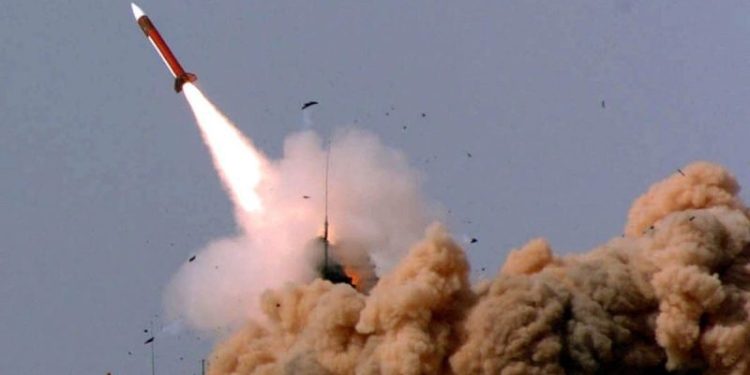A Jewish-American national security group is sounding an alarm about how America and Israel’s enemies may exploit low missile stockpiles after the 12-day war with Iran.

Defending Israel and the Al Udeid Air Base in Qatar from Iranian counterstrikes cost the U.S. and Israel between $1.48 billion to $1.58 billion, according to an analysis by the Jewish Institute for National Security of America (JINSA), and burned through a large portion of missile interceptor stockpiles.
Both the U.S. and Israel now face an ‘urgent need’ to replace those stocks and sharply increase production rates.
The U.S. had roughly 632 Terminal High Altitude Area Defense (THAAD) interceptors before June 13, the day Israel began its offensive in Iran. About 540 interceptors remain in its arsenal based on JINSA’s calculations of interceptor deliveries and use, according to the report.
In addition, the two Patriot missile interceptor systems responsible for defending Al Udeid, the U.S.’s largest base in the Middle East that’s home to 10,000 soldiers, reportedly used roughly 30 Patriot interceptors against the 14 Iranian ballistic missiles targeting the site June 23, The interceptors cost about $3.7 million each, totaling $111 million.
Iran launched 574 medium-range ballistic missiles toward Israel and the U.S. airbase in Qatar after Tel Aviv and Washington conducted strikes on Iranian military and nuclear sites between June 13 and June 24, when the conflict ended in Iran’s counterstrike in Qatar.
Lt. Gen. Thomas Bergeson, former chief of U.S. Central Command, said the U.S. and its allies needed to do more to invest in nonkinetic interception mechanisms,or systems that can neutralize a threat without explosive force, would be much cheaper in defending against future attacks.
‘There’s any number of operational test and developmental testing going on with a cheaper bullet than a multibillion-dollar interceptor to shoot down a relatively inexpensive missile or UAS,’ he said. ‘Any electro-magnetic interference capability, a microwave laser EMP, whatever that can screw up, the guidance system or the proportion of that particular system is something that could be cheaper.
‘You can have literally hundreds if not thousands of rounds in one interceptor at very low cost.’
While the cost for the U.S. and Israel was high, the cost for Iran was greater — between $1.1 billion and $6.6 billion. Air defenses saved Israel about $13.5 billion in property damage.
Iran used up between a third and a half of its ballistic missile arsenal during the 12-day conflict, suggesting Iranian assertions it could have continued striking Israel for years if it wanted were overblown.
Replacing its missile stockpiles will be even more costly given that Israel struck many of its launchers and production sites.
But the U.S. used up 14% of its global stockpile of prized THAAD missile interceptors. America’s THAAD system accounted for nearly half of all interceptions due to ‘insufficient’ capacity of Israel’s Arrow interception system.
It would take three to eight years to replenish the THAAD interceptors used in the 12-day war at current production rates.
Patriot interceptor production is more robust than THAAD, according to the report, but the U.S. is providing a number of Patriot interceptors to Ukraine. So, it’s unclear how many remain in the stockpile.
If the U.S. and Israel fail to urgently replenish their interceptor inventories — especially THAAD and Patriot systems — they risk entering the next crisis with dangerously thin defenses, according to the report. Adversaries may take note of the extended gap between munitions use and stockpile replenishment, which leaves U.S. bases across the world open to vulnerabilities.
‘Iran’s large-scale missile campaign may have revealed vulnerabilities in Israeli and U.S. air defense systems, providing lessons that Iran or other U.S. adversaries could exploit in the future,’ the report said.
The Pentagon could not immediately be reached for comment on its plan to replenish missile interceptor stocks.




